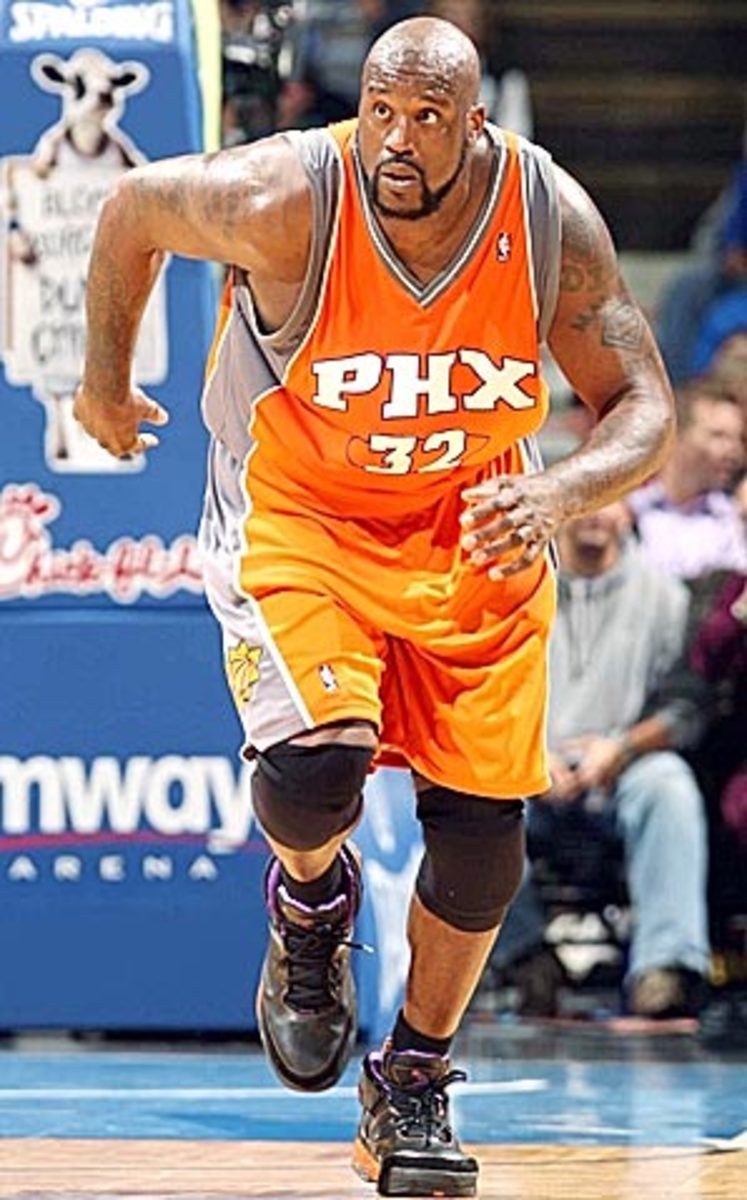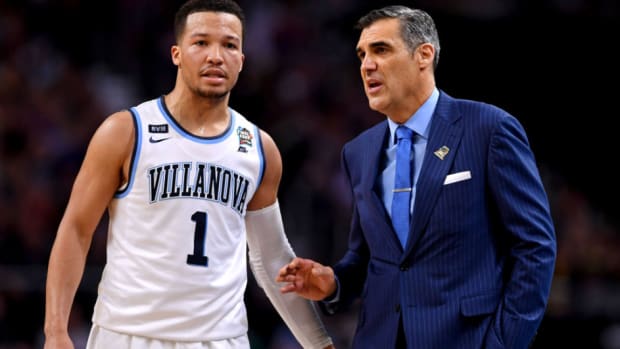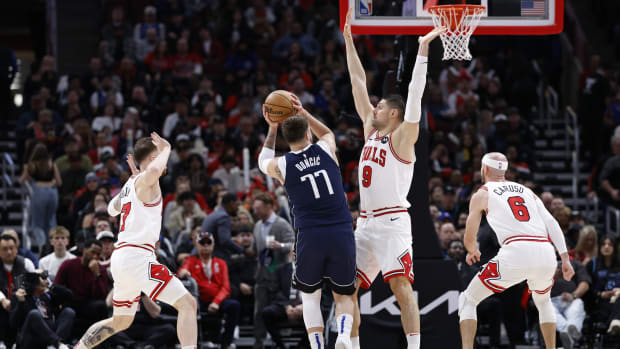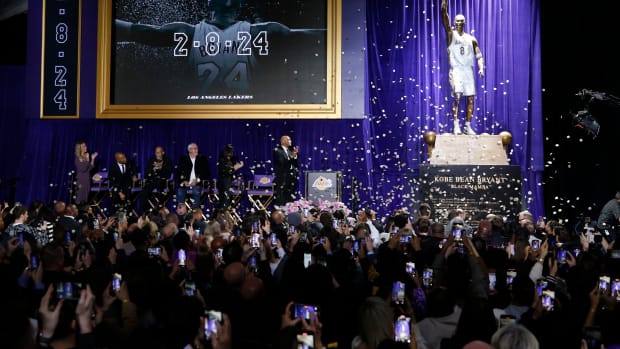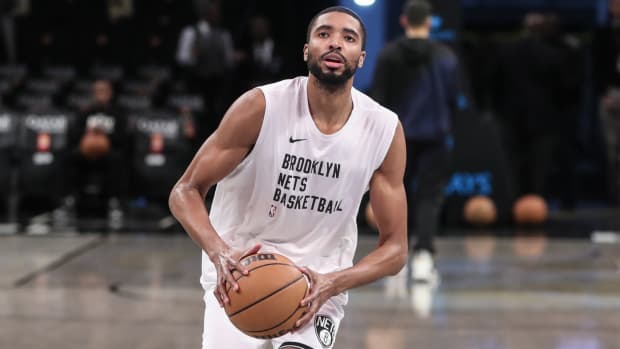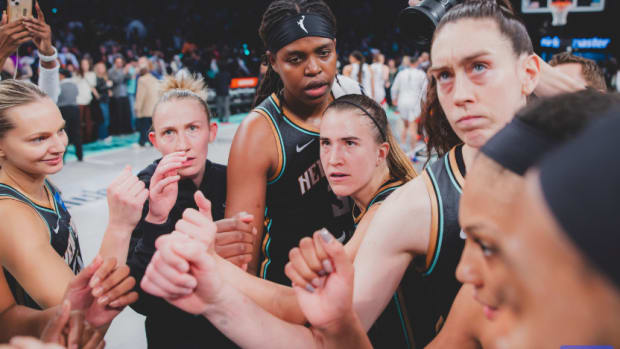Roundtable: Debating the Diesel
SI.com NBA writers analyze the latest news and address hot topics from around the league each week.
1. Does Shaq get a free pass for his antics?
Ian Thomsen: When people refer to the NBA as "a business,'' they're dealing with questions like this one. Is Shaq worth the trouble he creates? Of course he is. He wins championships, he dominates with his play and his personality, he creates interest and therefore money. The antics are never anything so bad; it's not like you ever read about his being charged with a crime. Dwight Howard was upset by O'Neal's rebuke, but any kind of rivalry between them will only raise Howard's profile and ultimately he and the NBA will benefit. The guy is 37 and he's still one of the league's top players, so he has earned the right to speak his mind.
Jack McCallum: The short answer, I suppose, is yes. But it's more complicated than that. Over the years he has been criticized a fair amount for his torching of coaches after he leaves, for his reversal of positions, for his need to immediately assume control of every team he's on and for his less-than-diligent approach to conditioning. But it doesn't stick. Part of that is the fault of people like me, who come into town determined to roast Shaq, then find him so charming -- and newsworthy -- that somehow the storyline gets changed. But the other part of that equation is that the public doesn't want the criticism to stick. No matter what it hears, it just likes the guy and is drawn to his outsized comedic talent. He will remain, throughout his career, a 7-foot-1 cartoon character who, most of the time, makes everyone feel better. That, and a Hall of Fame center who won four championships.
Chris Mannix: Of course he does. He's Shaq. He's as lovable as a cartoon character and has more nicknames -- Shaqovich is a personal favorite -- than every boxer in the welterweight division. Does he sometimes take his antics too far? Sure. Shaq took Stan Van Gundy's comments a little too personally, and Chris Bosh clearly didn't take kindly to being called the "RuPaul of big men." But this isn't Terrell Owens we're talking about here. Shaq isn't a divisive force in the locker room. More times than not, O'Neal is just goofing around. Shaq himself said this season that everything he says is done for the purposes of marketing. If we believe that, why should we ever take him seriously?
Steve Aschburner: The Big Provocateur does seem to be sheathed in an XXXXL suit of Teflon, in terms of nasty stuff sticking to him. He has been able to shrug off and move on from some pretty unsavory situations, no small feat for a guy who feuds with words the way the Hatfields and the McCoys used bullets. I guess it's the cleverness of some of his remarks, that half-smile, half-smirk with which he delivers them and the twinkle in his eye when he knows he's entertaining his media audiences. But that's no excuse for meanness, a line he has stomped across recently regarding Van Gundy and Bosh. So let's say that O'Neal gets a deeply discounted pass.
***
2. What will be Allen Iverson's legacy as a player? How will his experience in Detroit affect how he's viewed?
Ian Thomsen: He isn't for everybody. You can't ask Clint Eastwood to be a character actor in a movie; he wouldn't know how to play it. Very few players have the talent and charisma to carry a team as Iverson has done, including his 2000-01 run to the NBA Finals as league MVP with the 76ers. I want to see how he does coming off the bench. Everyone has been so afraid to ask him to become a sixth man that we still don't know how he'll do in that role. Maybe he'll be terrific and he'll go into the summer as a free-agent target for teams in contention.
Jack McCallum: His legacy is not simple. It should be this: an undersized, uber-talented bundle of energy who was one of the few players even cynical journalists would pay to see. However, he is also a shoot-first, defensively challenged player who was never able to lead a team all the way and whose best days came under the coach with whom he battled the hardest, Larry Brown.
Chris Mannix: That's a tough question to answer right now, because the stench from Iverson's brief stops in Denver and Detroit -- and whatever team he winds up with next season -- is still fresh. But just like the memory of Michael Jordan in a Wizards uniform has begun to fade, so will the last few years of Iverson's career. And after that happens, we will remember him for what he is: one of the most dynamic players in NBA history and a 6-foot guard who almost single-handedly carried offensively challenged Philadelphia to an NBA championship. Iverson's accomplishments in 10½ seasons with Philadelphia -- Rookie of the Year, NBA MVP, seven-time All-Star and four-time scoring champion -- are simply too significant to overlook.
Steve Aschburner: Iverson already ranks high on the lists of the NBA's greatest pound-for-pound and inch-for-inch performers. What strikes me now, in the wake of his moves from Philadelphia to Denver to Detroit, is that he also sits at or near the top among players (especially non-centers) whose games are almost self-contained. It's like he's working in a plastic bubble, playing the same whether surrounded by Sixers, Nuggets, Pistons or All-Stars. He is a jazz soloist with everyone else reduced to rhythm section, that's how dominating and separate his style of play is. That's why he would be perfect in a sixth-man role, a late-career resurgence that -- if only he would embrace it -- could balance his lack of a championship, legacy-wise.
3. Is Rajon Rondo's absence a bigger blow to the Celtics than Kevin Garnett's?
Ian Thomsen: Garnett is indispensable at both ends of the floor. When Garnett isn't playing, the loss of Rondo is deadly as an out-front defender, ball handler and playmaker who creates defensive imbalance in the open floor as well as in the half court with his drives. Rondo's talents cannot be replaced, but it is Garnett who provides the Celtics' identity.
Jack McCallum: OK, there is a significant gap between Rondo and backups Eddie House (not really a point guard) and Stephon Marbury (not really a Celtic). But let's not go overboard on the importance of Rondo, whom I love as a player. Boston derives its energy, defensive intensity and championship brand from Garnett.
Chris Mannix: Definitely. Glen Davis, too. I think you can make a case that Brian Scalabrine and Tony Allen are more valuable than KG. Wait ... you weren't making a funny? Not to downplay Rondo's significance, but no player is more valuable to the Celtics than Garnett. He is the linchpin of the defense, a consistent low-post threat and the team's most vocal leader. I'm not sure Boston has enough to get out of the second round without Garnett. And I know it wouldn't stand a chance in a seven-game series with Cleveland. That doesn't mean Rondo isn't critical to the Celtics. He's just more replaceable than Garnett.
Steve Aschburner: As valuable as Rondo's contributions have been, as much as his game and his confidence have blossomed these past two seasons, he remains a far more replaceable player than Garnett. What a point guard does on offense -- serve as its quarterback -- is what Garnett does on defense, calling out reads, directing traffic and generally organizing things from the back line. And even approaching age 33, he remains a unique player, ridiculously long and agile enough to cover pick-and-rolls nearly by himself -- showing hard, getting back, arms stretched to contest shots or thwart passes. He also is Boston's jumper cables emotionally, half-muzzled if he's only available before games and at halftimes in the locker room. House and Marbury can pick up a lot of Rondo's slack, but few players in the league -- never mind on the Celtics' roster -- can pick up Garnett's.
***
4. As part of its new playoff system, the D-League is allowing the three division winners to pick their first-round opponents. The top seed chooses first, the second and third seeds follow in that order and the No. 4 seed is left with the remaining team. Do you like this idea for the NBA?
Ian Thomsen: I don't like it for the NBA. But I do like the fact that somebody is trying to come up with new ideas. In theory, it should be interesting to watch -- not that a lot of people will watch, because the D-League is still the D-League. If the teams in the bottom of the bracket have no control over their seed, then what will they be playing for over the final weeks or days of the season? A coach won't be able to tell the No. 6 team to play hard because the players may already be able to guess which opponent will pick them in the playoffs.
Jack McCallum: I would love it. Fans would love it. It's something different. It puts more significance on the regular season. The team that got picked first as an opponent would take umbrage and find additional motivation for what might be an otherwise boring first-round sweep. Though it smacks of attention-grabbing novelty, it makes complete sense. Therefore, they'll never do it.
Chris Mannix: No, and neither does the NBA. The league's thinking on the NBADL playoffs is this: NBA teams are allowed to assign and recall players at their discretion. But when a player is sent down, it can significantly affect the talent level of a D-League team. A team that was seeded eighth could suddenly find itself as the favorite against a No. 1 seed simply because it was able to add an NBA-level player. A good example is the Utah Flash. Utah's current 20-14 record doesn't put it in the top three of the standings, but last week the Jazz assigned sharpshooting guard Morris Almond and 7-1 center Kyrylo Fesenko to the Flash. If the Flash were to wind up seeded seventh or eighth, is it fair for the top seed to have to play a loaded team like that? This could never happen in the NBA, which has the trade deadline and free-agent-signing cutoff date as safeguards to prevent teams from loading up for the playoffs. Barring a devastating injury in April, teams are seeded exactly where they are supposed to be. A good idea for the D-League, but not for the NBA.
Steve Aschburner: Love, love, love this idea. It seems gimmicky and soft at first, vague-ing up what always have been tangible rewards in a concrete system for the slog through 82 games. But that's the point; the regular season is too long and important to let playoff fortunes be dictated by a win here, a loss there, without regard to who's hot, who's injured and so on. We've seen it plenty where a relatively meaningless game on the season's final night bumps some contender into a different first-round matchup and, well, changes everything. This way, teams could use their most recent and most pertinent information, focusing on matchups and flexing the reward of influencing their own playoff fates. There would be at least two other terrific benefits: It would provide instant motivation for the teams chosen as somebody's alleged patsy, the underdog coach's ultimate bulletin-board material. Also, it would offer an option for fan involvement, encouraging people to help choose the first-round foes (of course, you'd need some way to stop rival markets from gaming the system). And the NBA loves few things more than new marketing ideas.






























